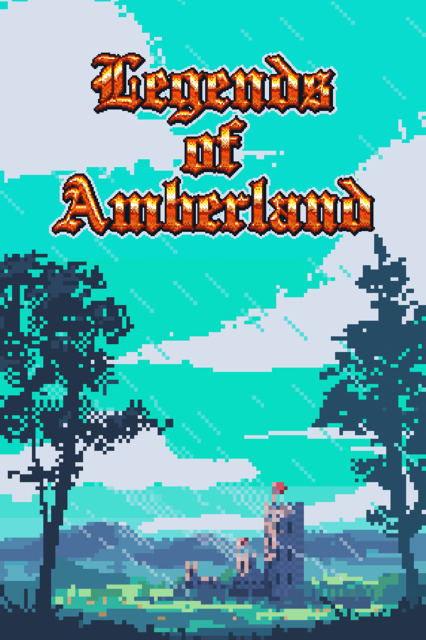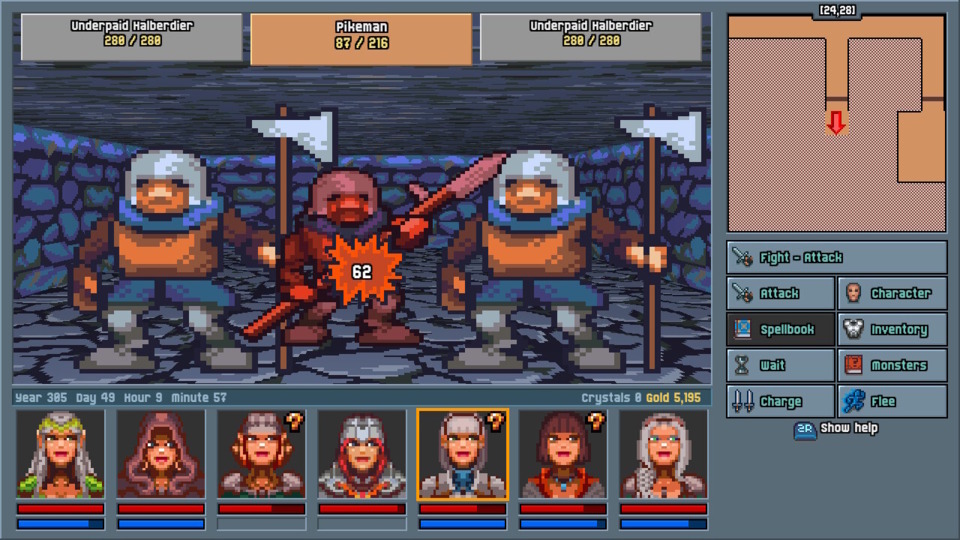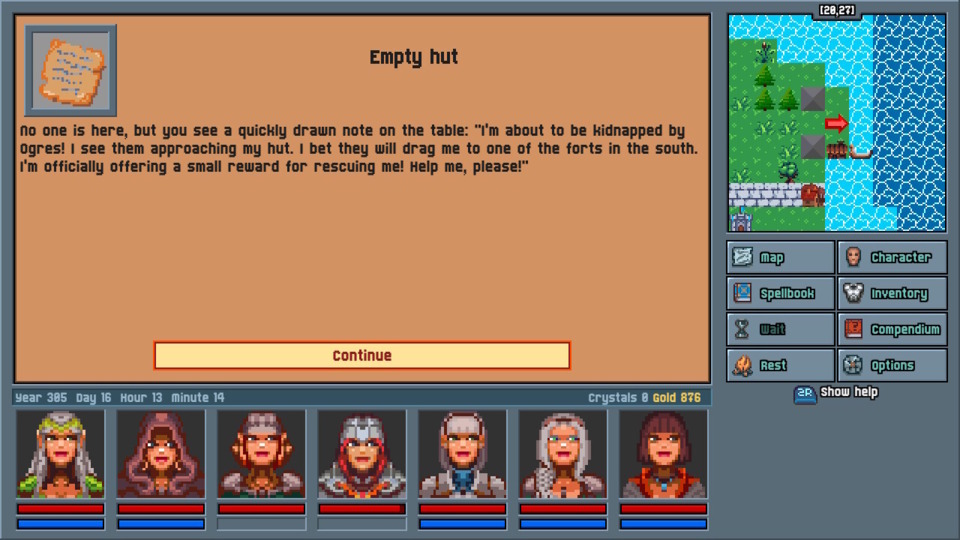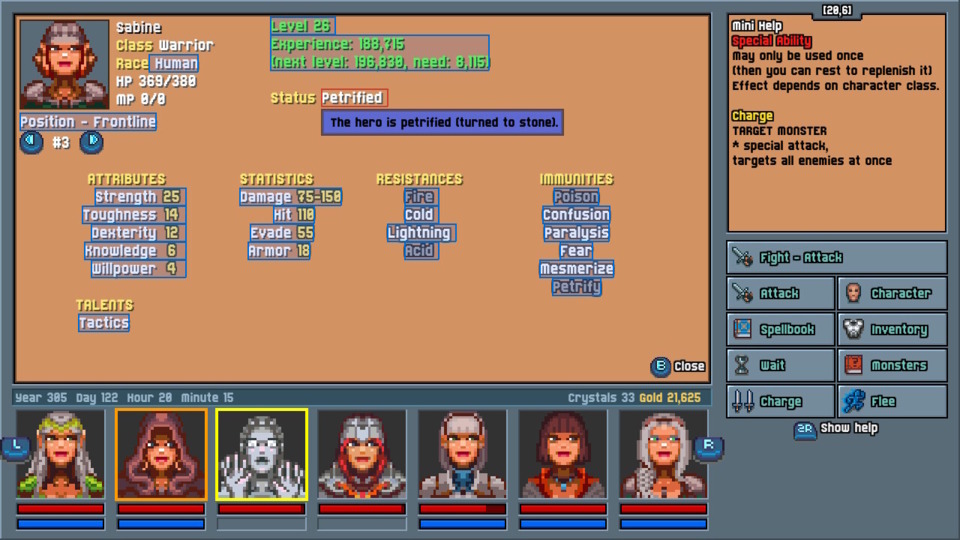Indie Game of the Week 281: Legends of Amberland: The Forgotten Crown
By Mento 3 Comments

Way, way back in ancient times when the Earth was still new, also known as the 1980s, there were three major CRPG franchises duking it out for supremacy on any early IBM PC with the processors to handle them: Ultima, Wizardry, and Might and Magic. All have since met with ignominious ends: Ultima vanished into space along with Richard Garriott's rocket (which, I should clarify, did not actually vanish); Wizardry is now entirely the domain of Japanese doujin developers who have had mixed success with the brand; and as for Might and Magic? Well, Ubisoft owns it now, and it's never been quite the same since. After the muted reception of the actually fine Might and Might X, they've stashed that IP in a dark place so far out of view not even the tallest open-world waypoint tower can spot it.
As always, when it comes to revisiting a beloved, archaic era of video gaming, the Indie strata of game development is here to provide. Legends of Amberland: The Forgotten Crown is unmistakingly and unapologetically riffing on Might and Magic from back in its halcyon days of being a cardinal-direction dungeon-crawler, a format it embodied and later helped define from its first entry, The Secret of the Inner Sanctum, on to its fifth, the Darkside of Xeen. Plenty of liberties have been taken with the mechanics - Amberland is considerably more streamlined, and feels a little more perfunctory and surface-level as a result - but even if you only have a passing familiarity with the interface and structure of a given Might and Magic of a certain vintage the game's allusions should be immediately apparent. Even the more obscure aspects that everyone's long since forgotten, and I only remember because I played Clouds of Xeen relatively recently, like a special second currency used for special traders that can only be found in dungeons with a magical theme, or the way some quests are accompanied by titles like "Saviors of the Eastern Kingdom" that add nothing extra to your rewards except for a running tally of your accomplishments.

In Amberland (which I keep wanting to write as Ambermoon, a contemporaneous Might and Magic rival; I'm sure the similar names aren't a coincidence), the player builds a party of up to seven characters which fan out in a V shape formation - so the person in the middle gets the most aggro, and the two at the wings see the least - and sets out to complete a request sent to them by the King's court wizard: track down and recover the subtitular crown that has been enchanted in such a way that everyone has blanked on its purpose, following a breadcrumb trail of clues to its final resting place. Naturally, this isn't as easy as simply walking across the map to where the crown is kept: the player is given many additional steps and scavenger hunts along the way to ascertain its current whereabouts, and accrues various other side-quests as they explore. Many dungeons contain items you'll need for one quest or another but most exist simply to provide monsters to kill, which increases the party's experience levels (as in Might and Magic, you have to hire a trainer to actually level you up, so returning to settlements regularly is recommended) and rare equipment to keep you alive - both of which allow for further exploration past the tougher monsters prowling the overworld map.
In many respects, Amberland feels like the Civil War re-enactment version of the original Might and Magic. Gone are almost all the rough edges, most of the deeper mechanics and puzzles, there's a fraction of the treasure you'd normally find and it's only comprised of currency, equipment, and key items needed for quests, regions and dungeons are rarely populated by more than a couple of enemy types simultaneously, and the world of Amberland just feels rather empty in comparison to its inspiration even with all these towns and NPCs and hordes of creatures roaming the place. The classes seem fairly complex at first - there are prestige classes open only to specific races, and racial sub-categories that for instance break elves down into wood elves, high elves, etc. each with their own racial bonuses - but as with most simple RPGs you're better off going with pure classes for their maximum potentials rather than the many breeds of watered-down hybrid that hit a wall in the late-game when it comes to their usefulness. Most classes have one or two stats that are worth pumping points into when levelling up and with seven party member slots there's no real need to spread yourself too thin since all you need are fighters, offensive mages, and healers. That means there's nothing for a rogue to do: no traps, no locks, no hidden walls (at least that I've found; it could just be they're very well hidden), and so the roguish ranger and bard classes tend to be fighter/magic-user hybrids of slightly differing utility (bards have healing spells, rangers use a little offensive magic). Most of the game boils down to entering a dungeon, killing everything that's milling around down there, grabbing any treasure if you're lucky enough to find some (several dungeons are completely barren of items or purpose beyond being monster lairs), and then head back to town and level up. Eventually, after enough of these, you can start pushing through zones like the desert - where the monsters are several magnitudes harder to deal with - to all the similar caves and mage towers that lie beyond.

That isn't to say Amberland is a complete snoozefest, nor that it's rudimentary to a fault. It realizes that it can't waste the player's precious time the way those older games did in the name of difficulty, so one of the earliest side-quests you can come across will unlock an instantaneous fast-travel system that greatly cuts down on overworld navigation. One of its novel features is the inclusion of master craftsmen, whom are NPCs that can be rescued from dungeons and once freed add to every shop's inventory across the world: each store has a universal selection of items that can only be expanded in this way, and craftsmen tend to be found at a rate equivalent to your own characters' development. With this feature, the game can keep its shops stocked with weapons and armor that would be roughly on par with whatever the player has already found from their dungeon excursions without forcing them to track a dozen different distinct shopping inventories across the world, which is an elegant if simple way of handling a CRPG's requisite mercantile system.
Amberland does also carry over Might and Magic's predilection for status effects, particularly the annoying, nasty, and debilitating types that might necessitate you bouncing from the current dungeon and go looking for the nearest town's healer for their services. The game has six of these, ranging from poison to petrification, though you can find equipment and accessories that protects you from any number of them. My tank-like Knight character, who sits in the most forward position and receives the most attacks, has her equipment configured in such a way that she's immune to every status effect; others in my party might have to have their gear moved around if the local enemies have a particular status effect they like to inflict. It is perhaps the truest homage to the hardships presented by those older games, yet one that can be mitigated fairly easily (it's worth having a couple of healers in the party regardless, though).

I might call Amberland the Cliff's Notes version of the type of RPG experience you were likely to find in the west around the '80s and early '90s. It is relatively truncated in its systems and approach, both by the realities of an Indie developer's budget and in how those older Might and Magics weren't terribly complex to begin with, and its basic gameplay loop can start to wear you down before too long even if most encounters can be breezed through in seconds. On the other hand, it does everything it can to alleviate the unsatisfying legwork that might otherwise pad out the runtime: fast-travel, a generous resting system that lets you recoup your HP and MP in most places without interruption, a dedicated button to explaining any stat or status effect or equipment bonus as well as expanding on any side-quest and in particular where its quest giver can be found, a combat engine quirk where you can simply repeat that character's last action with a single click if you just want to trash a weaker enemy fast, and an overall straightforwardness that makes it hard to get too lost in the world or be unsure how to proceed. Generally speaking, you poke at the contours of where you can go and if the enemies are manageable - that is, no party wipes and no having to run back to civilization for succor after just one or two encounters - you can probably press further into that zone or dungeon and take whatever it has for you; if the monsters there are too much, there's probably a half dozen other places to try. On the whole, I'd project that it probably shouldn't take over 20 hours, which is probably the perfect length for its relative lack of nuance.
I'd say if you were a fan of the older Might and Magics and wanted a quick nostalgia fix without the concomitant jumping through hoops every time one of your guys gets tagged with insanity or some other status that's equally hard to shift, Amberland could have what you're looking for, at least for a while. For anyone else curious about these old games, though, I might recommend instead that you go directly to the source: they tended to have a lot more going on.
Rating: 3 out of 5.
Post-Playthrough Edit: Yeah, the ending - where the mastermind antagonist turns out to be "some dude in a cave" who just fights you without a discussion - really emphasizes how little the game is interested in weaving a story, and more in hitting the beats of an ancient Might and Magic game. To some extent there's something commendable about a laser-focus behind a game's intent to just pick out a very specific game format from a bygone era and just make another one of those in the present, but I've always believed these Indie retro types are capable of ascending beyond the original source materials; many throwbacks manage to find some intriguing new spin, beyond the expected gaggle of modern quality-of-life game design improvements.
| < Back to 280: Coffee Talk | The First 100 | The Second 100 | > Forward to 282: The Lion's Song |
